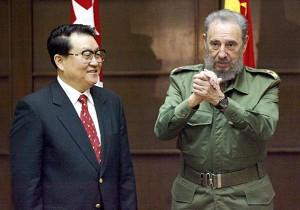In order to cement its transition of power, the leadership of the Chinese Communist regime has recently stepped up efforts to boost the authority of Xi Jinping and Li Keqiang—the likely leaders of China in 2012—and destroyed documents with negative details of their past.
A Collective Campaign Supporting the Likely Leadership of China
On the eve of the Chinese New Year 2008, Hu Jintao delivered a keynote speech at a meeting of the Standing Committee of Communist Party’s Political Bureau on how to boost the authority of the new generation of Chinese leadership, including Xi Jinping and Li Keqiang.
Meanwhile, Chinese Vice President Zeng Qinghong, former Political Bureau Standing Committee members Wu Guanzheng and Luo Gan, former Vice Chairman of the Central Military Commission Cao Gangchuan, and other public officials including Zhang Wannian, and Chi Haotian, have each campaigned respectively to enhance the image of Xi and Li among the Party, the government, and the military.
Hu is Responsible for Mentoring Xi Jinping and Li Keqiang
At a meeting of the Political Bureau Standing Committee aiming to organize the Central Military Commission, Hu Jintao mentioned that the new Political Bureau has to take the responsibility for mentoring Xi Jinping and Li Keqiang to enable them to deal with major projects of the Party and the government as soon as possible. Hu pointed out various difficulties and obstacles ahead, and warned that dissenters not act rashly or out of spite to interfere with the central government’s work or affect the unity in the party.
Xi Jinping and Li Keqiang are Confronted With Pressure
Many note that the reason behind Hu Jintao’s support for Xi and Li is that they both lack the exposure and support from factions both in the party and the military and are jealously criticized by peers after being promoted. At the Political Bureau Standing Committee, the Central Committee Secretariat meeting, and the State Council group meeting, Xi Jingping and Li Keqiang expressed that they could not do their work smoothly with the tremendous pressure they were under.
Warning Dissenters Respectively
After the 17th CCP National Congress, Hu Jintao, Wu Bangguo, and Wen Jiabao, talked to Liu Qi, Liu Yunshan, Wang Zhaoguo, Zhang Dejiang, Bo Xilai, Hua Jianmin, and Wang Gang respectively. In addition, on behalf of the CCP Central Committee, He Guoqiang, Li Changchun, and Ling Jihua called on local party secretaries to consider the overall situation, pursuant to the party’s organization principles and strategic planning to clearly recognize the impact resulting from personal emotion and behavior that could upset party unity.
Central Government Issued Documents to Demand Propagandizing New Leadership
The discontentment with the new leadership has existed not only among central committee members but also local party committee members. This sentiment is spreading and the usual widespread support of central government decisions is deteriorating.
On December 26, 2007, the CCP Central Committee disseminated a document entitled, “Some Views on the Collaborative Work of Promoting New Leadership” issued by the CCP’s Organization Department and the Central Propaganda Department. This document demands that officials obey new leadership, provide them with necessary staff and facilities, and promote them as much as possible. Furthermore, it is strictly forbidden to cause problems, interference or organize any group to challenge the new leadership.
Destroying Negative Records to Whitewash the Image
To safeguard the image of Xi Jinping and Li Keqiang, the Central Commission for Discipline Inspection and the Central Committee Organization Department have recently destroyed documents reporting the poor performance of Xi Jinping, Li Keqiang, and Li Yuanchao during their tenures of local duties, under the pretext of “being offensive, inconsistent with the facts, libel and defamation.”

